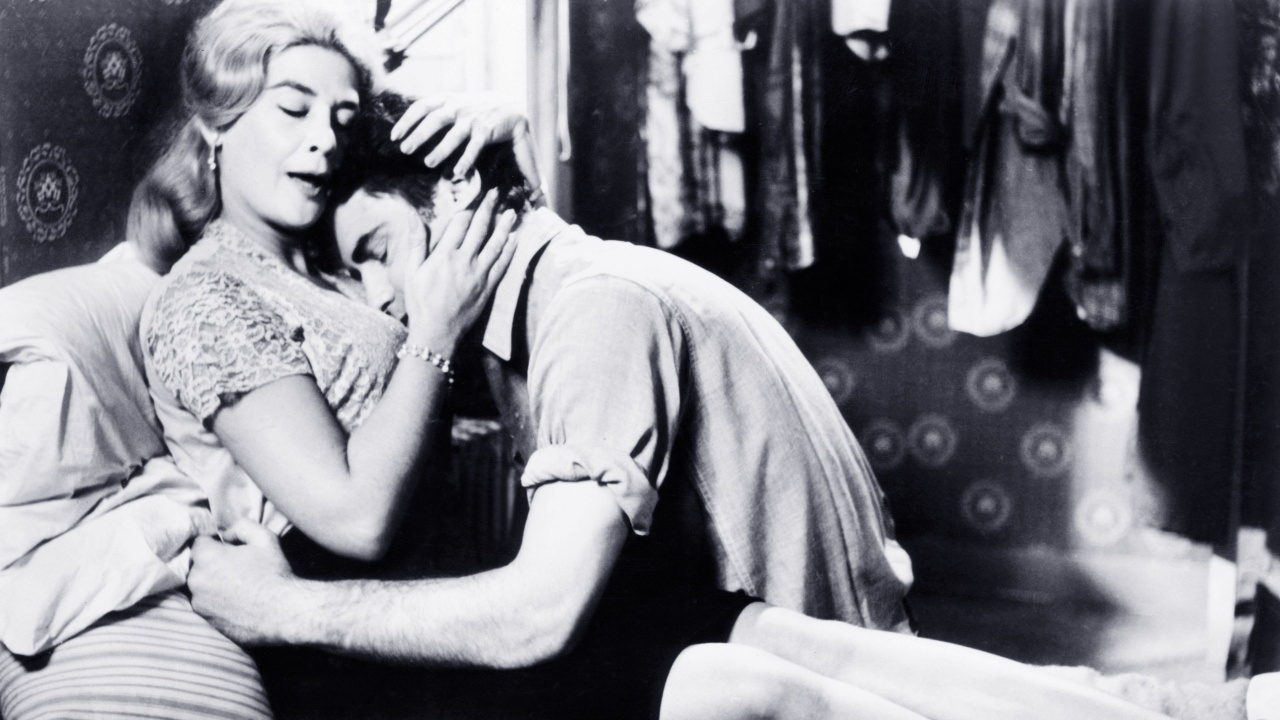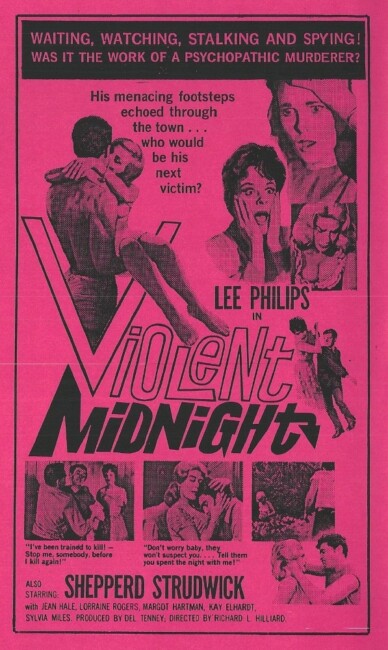aka Violent Midnight
USA. 1963.
Crew
Director/Story – Richard Hilliard, Screenplay – Robin Miller, Additional Dialogue – Mann Rubin, Producer – Del Tenney, Photography (b&w) – Louis McMahon, Music – Wilford Holcombe. Production Company – The Black Autumn Co.
Cast
Lee Philips (Elliot Freeman), Lorraine Rogers (Alice St Clair), Kaye Elhart (Dolores Martello), James Farentino (Charlie Perone), Margot Hartman (Lynn Freeman), Shepperd Strudwick (Adrian Benedict), Dick Van Patten (Lieutenant Palmer), Jean Hale (Carol Bishop), Sylvia Miles (Silvia), Sheila Forbes (Janet Terhune), Day Tuttle (Professor Arthur Melbourne), Mike O’Dowd (Max), Mike Keene (Inspector Grey)
Plot
Elliot Freeman has inherited the family estate in Stamford, Connecticut, following the death of his muchly hated father in a shooting accident. A former Korean War veteran, Elliot has now become a celebrated artist. Elliot’s current favourite nude model Dolores Martello desires Elliot and tries to play him off against her biker boyfriend Charlie Perone, resulting in a fight between the two men. Dolores then tries to blackmail Elliot by claiming that the child she is pregnant with is his, even though they only slept together once six months ago. The next morning Dolores is found stabbed to death. In investigating the murder, the police question both Elliot and Charlie as suspects. Elliot’s half-sister Lynn arrives in town to become a pupil at the Belmont School for Girls. There both Carol Bishop and the provocative Alice St Clair show an interest in Elliot. Soon however, a black-garbed mystery figure appears and starts stabbing the girls.
Psychomania is an interestingly obscure psycho-thriller from the early 1960s. It is one of the essential works in the small oeuvre of Connecticut-based director Del Tenney. Tenney gained a psychotronic reputation for several low-budget films he directed, including The Curse of the Living Corpse (1964), I Eat Your Skin (1964) and especially the Z-movie classic The Horror of Party Beach (1964). Tenney does not direct, as is sometimes misreported, but only produces Psychomania. The actual directing chores are handled by Richard Hilliard who, aside from this and photographing/writing several of Del Tenney’s films, only ever made a handful of obscure sex-themed films.
The film was originally made under the title Violent Midnight – and has been re-released under such name – although was retitled Psychomania for its initial cinematic release. Clearly, the distributors were hoping to capitalise on the success of Alfred Hitchcock’s Psycho (1960), which had come out only three years earlier and had inspired a mountain of psycho-thriller imitators. (This Psychomania should not be confused with the other British-made title Psychomania (1973) about a biker gang resurrected from the dead).
Psychomania takes the voyeuristic psycho-sexual pathologies that ran through Psycho and pushes them to a greater extreme. Indeed, the entire film seems to have been set up as a single voyeuristic titillation. We get an inordinate number of shots of Lee Philips’ various nude models arrayed in front of the camera and showing as much bare flesh as it was possible to get away with in the early 1960s. There are lots of gratuitous scenes of the girls in their college dorm room dancing in their underwear, undressing (as seen from behind) to get into the shower where they can be seen nude through a semi-opaque window and getting out clad in towels; or of them heading down to the river to go swimming in their bikinis. As in Psycho, not far away lies the ever-present theme of disturbed voyeurism – in the opening moments, Kaye Elhart preens in front of a mirror nearly revealing all and is jolted by the momentary reflection of a masked figure watching, while there is the character of the professor (Day Tuttle) who is constantly peeping in on the girls and lurking behind a tree while they go swimming.

There is the suggestion underlying the film that girls being brazenly sexual or parading their bodies stirs up dangerous and uncontrollable passions in men that can get them killed. This does seem hypocritical considering that the filmmakers seem to be doing all they can to inflame said passions in viewers with such copious parades of semi-clad flesh. There is an amazing scene where Day Tuttle’s voyeur professor spells it out during a lecture that is accompanied by time lapse shots of flowers blooming wherein he makes a striking metaphor about how plants ripen to puberty and then die almost instantly: “There is a lesson here, young ladies – do not let our lives be carried by passion beyond the bounds of good taste,” he says. All of this fascinatingly torrid subtext is let down by the improbably contrived revelation of the killer’s identity where we learn that they weren’t stirred by these aroused sexual passions after all.
The plot manages to become amazingly lurid. Del Tenney seems to love having scenes in his films of knife fights between the hero and bad boy bikers – he has near identical such scenes both here and in The Horror of Party Beach. Lorraine Rogers gives a good performance as the strumpet Alice. She comes onto James Farentino: “Hey, you smell of tobacco, beer … and animal” and they end up making out (in closeup) in the school laundry room. Later she greets him: “Well if it isn’t the Stanley Kowalski of the laundry set” and proposes stealing Lee Philips car to head to the lake to go skinny-dipping. There is the fascinating character of Kaye Elhart’s model Dolores who makes her interest known to Lee Philips then takes him out to a bar where biker boyfriend James Farentino is expecting her to turn up for a date, resulting in a fight between the two men, followed by a scene where she tries to blackmail Philips by telling him that the baby she is pregnant with is his. (You can imagine just how much of a jolt that the theme of blackmail over unwed pregnancy would have had in the much more socially conservative 1960s).
There are some interesting names in the cast. James Farentino makes his first ever film appearance as the bad boy biker. Dick Van Patten gives his first ever screen performance too as the investigating detective. Sylvia Miles also turns up as James Farentino’s girlfriend Silvia, dressed like a cheap tramp and looking all of 40 even though is supposed to be around the age of 20. Margot Hartman, who plays the hero’s sister, later married Del Tenney.
Full film available here


